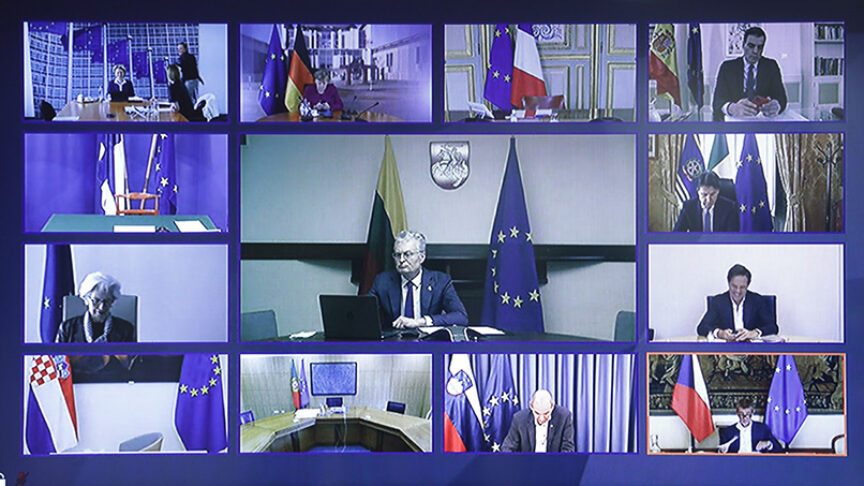Shared goals: How Germany’s crisis response could strengthen Europe
Berlin has quietly made concessions to new calls for greater solidarity. But back home this consensus may not last forever.
After losing to West Germany in the 1990 world cup semi-final, England striker Gary Lineker famously said: “Football is a simple game. Twenty-two men chase a ball for 90 minutes and at the end, the Germans always win.” After the European Council’s video conference last week, some of its participants must have felt the same.
In the days leading up to the call, political leaders presented their far-reaching visions for sharing the financial burden of the coronavirus crisis, invoking the spirit of solidarity to describe the future of the European Union. Spanish prime minister Pedro Sanchez proposed a huge recovery fund financed through perpetual EU debt, which would have provided grants to the worst-hit countries. His Italian counterpart, Giuseppe Conte, made a strong case for coronabonds and threatened to derail negotiations altogether if the European Council refused his demand. And French president Emmanuel Macron raised the stakes by linking the survival of the EU itself to the issuance of “common debt with a common guarantee”. In the end, though, the leaders agreed merely to work towards setting up a recovery fund – very much along the lines Angela Merkel outlined in the Bundestag prior to the summit. Coronabonds or any other version of an explicit mutualisation of debt are clearly off the table.
One reading of the summit is that the German government has once again fallen short. Those who had hoped Angela Merkel would use her political clout to push through unpopular measures in her own party and among the German population are disappointed. They accuse the chancellor of paying lip-service to European solidarity while continuing the same old technocratic euro-crisis policy of the past decade.
But, in reality, Berlin has shifted position in recent weeks. By supporting the €500 billion package put together by the eurozone finance ministers – in particular by supporting access to loans from the European Stability Mechanism without conditionality – the German government has already made concessions that would have been hard to imagine before covid-19. And Merkel has linked her commitment to a European recovery fund to the promise to pay considerably more into the EU budget. This is a fundamental departure from Germany’s previous demand to limit EU budget contributions to 1 percent of the bloc’s GDP. Both the chancellor and German finance minister, Olaf Scholz, are profoundly convinced of the need to help crisis-hit countries as soon as possible. It is why they have reached for instruments that are already deployable within the framework of existing treaties and the German constitution.
Merkel must show solidarity with Italy, Spain, and France without jeopardising the solidity of her own party.
Instead of hoping for the unrealistic – namely that the German government will turn its eurozone policy upside down – Berlin’s European partners should concentrate on what is feasible. In her fourth term in office, Merkel will not suddenly become a revolutionary force in the EU, but will continue to provide steady, goal-orientated, and cautious leadership. This is how things stand right now; and recent polling confirms Merkel’s commanding political position at home. But the mood could change at any time, not least when Germans realise they too are not immune to the severe economic consequences of the virus – and that the crisis is set to drag on for some time. In fact, the first cracks in the social consensus are already visible. Friedrich Merz, a candidate for the Christian Democrat leadership and potential future chancellor, gave an idea of the potentially toxic nature of this debate when he accused Italy of exploiting the coronavirus to “obtain unlimited refinancing possibilities for its national budget”. Merkel will certainly not have forgotten how 60 of her own MPs voted against her when the third rescue package for Greece came before the Bundestag in 2015. Openly supporting the mutualisation of debts would immediately break the unity the chancellor has managed to maintain. And, of course, she has no interest either in giving a boost to the Alternative for Germany party, which was founded in 2013 in protest at her eurozone policy.
The chancellor must therefore find a way to show solidarity with Italy, Spain, and France without jeopardising the solidity of her own party. Decisions around the upcoming multiannual financial framework provide the least-worst opportunity to do so: it is an easier sell back home to support more money for the European budget as an investment in Germany’s own future. A more sustainable, more digital EU ultimately sounds better to German ears than ‘transfers’ or ‘grant money’. At the same time, Merkel needs to ensure that the countries most affected by the crisis do not feel like losers in this game. Crucially, limited fiscal transfers and redistribution mechanisms should be allowed within the recovery fund. Because, this time, the eurozone may not survive if Germany again comes across as an economic occupier, flanked by smaller member states of frugal views and depriving Italians and Spaniards of their livelihoods. The ideas and preferences emerging from Berlin are proving powerful in shaping the future of a Europe in crisis. But to shape a Europe that lasts, they must create winners throughout the EU – not in Germany alone.
The European Council on Foreign Relations does not take collective positions. ECFR publications only represent the views of their individual authors.



